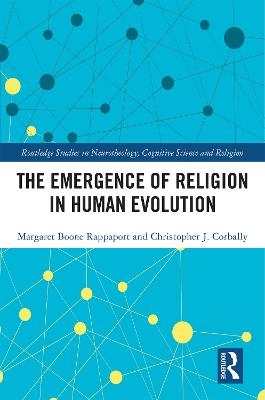
The Emergence of Religion in Human Evolution
Routledge (Verlag)
978-0-367-24520-7 (ISBN)
The approach relies on research findings in nine disciplines, including the work of countless neuroscientists, paleoneurologists, archaeologists, cognitive scientists, and psychologists.
This is a cutting-edge examination of the evolutionary origins of humanity’s interaction with the supernatural. It will be of keen interest to academics working in Religious Studies, Neuroscience, Cognitive Science, Anthropology, Evolutionary Biology, and Psychology.
Margaret Boone Rappaport, Ph.D. is a cultural anthropologist and biologist who works in human cognitive evolution, and as a futurist, lecturer, and author in Tucson, Arizona. As President, Policy Research Methods, Incorporated, she conducted research for federal agencies for 30 years. She lectured at Georgetown and George Washington Universities. Dr. Rappaport is also a prize-winning short story and poetry writer, and the Co-Founder of The Human Sentience Project, LLC. Christopher J. Corbally, S.J., Ph.D., is a Jesuit priest and an astronomer with the Vatican Observatory Research Group, for which he has served as Vice Director, and liaison to its headquarters at Castel Gandolfo, Italy. He is an Adjunct Associate Astronomer at the Department of Astronomy, University of Arizona, and ministers to a wide variety of Catholics, including Native Americans, in Tucson, Arizona. He is the Co-Founder of The Human Sentience Project, LLC.
Preface; Part I. Introduction to Theory; 1 New Sciences, New Findings, and a New Model; 2 Shifting Evolutionary Paradigms and the Study of Advanced Neurocognitive Traits; Part II. The Model; 3 The Human Hearth, the Circle of Light, and the Evolution of Morality; 4 Model for the Evolution of a Trait for Religious Capacity; Part III. The Implications; 5 The Neuroplastic Species; 6 Staying Alive, Becoming Religious; 7 Future Artificial Species: Will They Be Moral? Will They Be Religious?; Index
| Erscheinungsdatum | 06.12.2019 |
|---|---|
| Reihe/Serie | Routledge Studies in Neurotheology, Cognitive Science and Religion |
| Zusatzinfo | 8 Tables, black and white |
| Verlagsort | London |
| Sprache | englisch |
| Maße | 156 x 234 mm |
| Gewicht | 660 g |
| Themenwelt | Geisteswissenschaften ► Psychologie ► Allgemeine Psychologie |
| Geisteswissenschaften ► Religion / Theologie | |
| Naturwissenschaften ► Biologie ► Humanbiologie | |
| Naturwissenschaften ► Biologie ► Zoologie | |
| Sozialwissenschaften ► Ethnologie | |
| Sozialwissenschaften ► Soziologie | |
| ISBN-10 | 0-367-24520-5 / 0367245205 |
| ISBN-13 | 978-0-367-24520-7 / 9780367245207 |
| Zustand | Neuware |
| Informationen gemäß Produktsicherheitsverordnung (GPSR) | |
| Haben Sie eine Frage zum Produkt? |
aus dem Bereich


